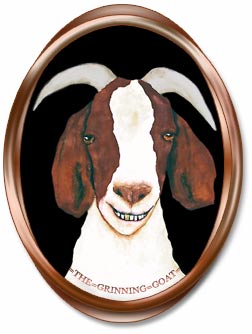|
Dealing
with Urinary
Calculi
Before
you read on please understand
that we are NOT Veterinarians. We
are simply sharing with you what
we have found in our journey
along the road within "herd
management of goats". The
treatment shared below is not
100% successful. Some animals
still die. We do know that some
goats have lived when this
treatment was used. Maybe they
would have lived anyway, with no
treatment or with another
treatment. All we can share is
what we have experienced using
THIS method.
Currently we do know that the
balance of Calcium and Phosphorus
is an important factor to the
prevention of UC. The problem
with this is that even though you
may have a balanced feed and
mineral supplement you can't
always figure for your hay and
pasture or the fact that certain
minerals in the water that your
stock is drinking can bind out
various elements.
That along with the fact that
some animals are worse than
others about picking out their
favorite ingredients from their
feed often make the prevention of
UC a real challenge.
We also know that UC can be
brought on by stress, especially
the stress of transportation. It
is not uncommon for animals to
have reduced fluid intake during
times of travel which seem to
increase the potential of UC.
It seems we are hearing from
more and more breeders that are
experience UC problems and need
to know what they can do to TREAT
a buck or wether that has an
active case of UC.
During the past year we have
had the opportunity to interact
with several different breeders
that have been experiencing UC
within their herds and to follow
the treatment of several
individual animals.
In the following text we will
attempt to share with you the
procedure used on the animals we
were involved with in a hope that
this information my prove helpful
to you and your veterinarian.
Please note- WE ARE NOT
VETERINARIANS and urge you to
consult YOUR OWN LOCAL vet for
assistance in treating UC and any
other illness you are
experiencing in your
herd.
How to identify a buck with
UC:
The first signs of UC are
normally noticed when the
breeders sees the animal
stretched out attempting to
urinate, usually either dripping
what appears to be urine from the
end of the penis or forcefully
straining with NO urine appearing
at all. Sometimes the breeder's
first thought is that the animal
is constipated - but constipation
is not very common in goats and
UC should be your FIRST thought
when you see a male goat of any
age stretched out in the
'urinating position' and you do
not see a stream of urine
flowing. Sometimes you may even
see the buck 'pulsing' a bit and
curling his upper lip . On
occasion you will find a buck
(kid or adult) that seems to just
lay down all the time and upon
closer inspection you will find
that the belly around the penis
area is wet or damp. This is
usually caused from urine leaking
while the animal is laying down
and should be considered a
SERIOUS cause for concern.
The next question is WHAT
TO DO???
The first thing is to take a
closer look. Catch up the buck
and LOOK at the penis. Easy to
say - but not always so easy to
do!
Depending on the size of the
animal (might be necessary to
have some help on hand here) the
best way we have found to expose
the penis is as follows; Standing
behind the buck , set him on his
rump with his spine resting
against your legs. Having him
slightly 'slouched' over - bend
over him and reach directly
behind the scrotum (this is
between the scrotum and the tail)
at the base of the scrotum, there
is a 'magic' spot that you can
put pressure on and when doing
can 'extend' the penis. At this
point you should be able to see
the HEAD of the penis. A healthy
penis head will be smooth and a
healthy pink color and you should
see small blood vessels on it. If
the head is purple, gnarled or
angry looking you have trouble
and we suggest at this point a
trip to your veterinarian is
advised.
Removal of the urethra process
has proven to be helpful in
treating UC. Ideally letting your
veterinarian do this and having
his assistance and direction in
treating the animal is ourfirst choice.
The urethra process is the
string or worm like extension on
the end of the penis that the
buck uses to 'spray' urine with.
The removal of the urethra
process doe not normally effect
the bucks fertility.
It is helpful to have a damp
washcloth (not 'wet' but just
good and damp) to hold onto the
penis with and a sharp pair of
suture scissors (small manicure
scissors work well and I was just
told that a large pair of toenail
/ fingernail clippers will also
work) cut off the urethra process
as close to the head of the penis
as you can. There is no advantage
of leaving any of the urethra
process in place. The urethra
process is VERY narrow and one of
the first places that stones and
grit will accumulate and plug up
the plumbing. AGAIN - having you
veterinarian to do this is the
recommend.
Once the urethra process is
removed sometimes you will get a
good urine flow, sometimes just a
dribble and sometimes no relief
at all.
Ideally your veterinarian will
have a sonogram machine and can
check the bucks bladder to see
how full it is. Quite frequently
by the time you have noticed
there is a problem the bladder is
full enough that is in danger of
rupturing.
Your VETERINARIAN can 'TAP'
the bladder, using an 18-19 gauge
spinal needle AFTER anesthetizing
the animal. PLEASE -- DO
NOT attempt to 'TAP' the bladder
yourself . The animals
needs to be immobilizedCOMPLETELY and an
anesthetic is required to do
this. Also, a comprehensive
understanding of the anatomy and
the procedure is needed and your
veterinarian will also understand
which anesthetics may exacerbate
the problem.
Understand that tapping the
bladder is done to BUY TIME for
further treatment to work.
Tapping the bladder by itself
will NOT cure the problem because
the problem is BLOCKAGE.
We have found that by
drenching the animals with an
effective ACIDIFIER, along with
the proper antibiotics to address
possible infection and possibly
special drugs to help relax the
urethra many animals have been
saved .
You need to monitor the fluid
intake and OUT FLOW of the buck
while you are IN TREATMENT with
your veterinarian so that you can
keep a close eye on the bladder.
We find that having the
veterinarian check the bladder
every 36 hours by sonogram is
advised, this lessen the chance
of rupture.
The ACIDIFIER we have used is
mixed in a heavy concentration at
first and the animal is drenched
with with an appropriate amount
depending on the age and weight
of the animal. Then the acidifier
is added to the goats daily water
rations for several months at the
least and better yet as an on
going attempt at prevention.
*PLEASE NOTE: Vinegar will
NOT work as an acidifier!
Acid Pack 4-Way 2x is
available through us and is
listed in our NUTRITION section
under Product Listing.
If your Veterinarian would
like to know more about this
procedure please have him/her
contact us at 417 754-8135 and we
will put them in touch with our
veterinarian.
***Please
note that the company that makes
the Acid Pack 4-Way 2x does not
manufacture this product nor
endorse it as a treatment or
prevention of UC. The suggestion
to use this product to treat UC
was made to us by our
nutritionist and treatment was
deemed successful. We are simply
sharing with you what has worked
in the field. ***
The following was shared by Donna
of Safehaven Nubians
*Subject: anionic salts used
to prevent stones
Apple cider vinegar does not
work to prevent urinary stones.
No way, no how. The "acidifying
agent" of vinegar is acetic acid.
The bacteria in a goat's rumen
make tons of acetic acid as a
part of digestive process.
What you are feeding them is
literally a drop in the bucket
compared to what they naturally
make themselves.
Here are a couple of the many
testimonials we have had from
folks that have used the Acid
Pack:
- Please send me three more
packets of the Acid Pack 4-Way
2x. I really appreciate this
medication. It has literally
saved his life.I HIGHLY recommend
it over the ammonium Chloride.
The improvement time was So much
faster. ThanK you so much, again.
L.K. from PA
- Please send me three packets
of the acidifier Acid Pack 4-Way
2x My buck continues to do well.
Check enclosed.. D.C. from OK
EMAIL
US | 




